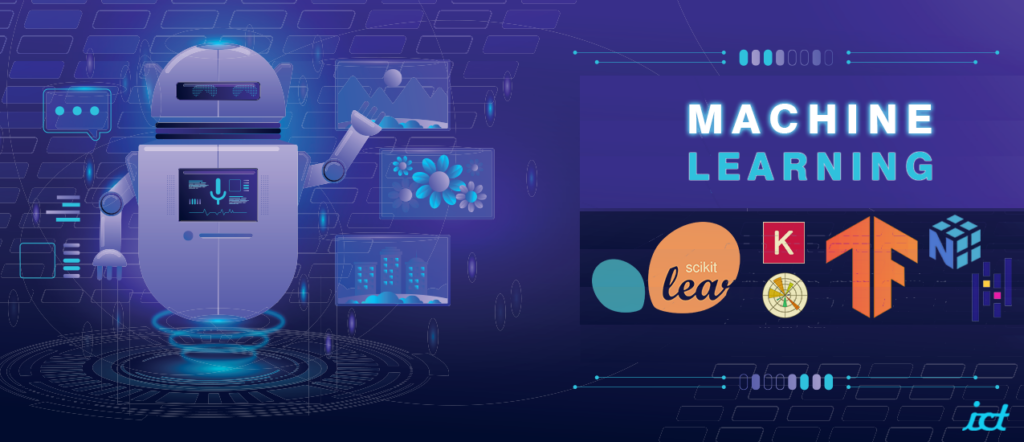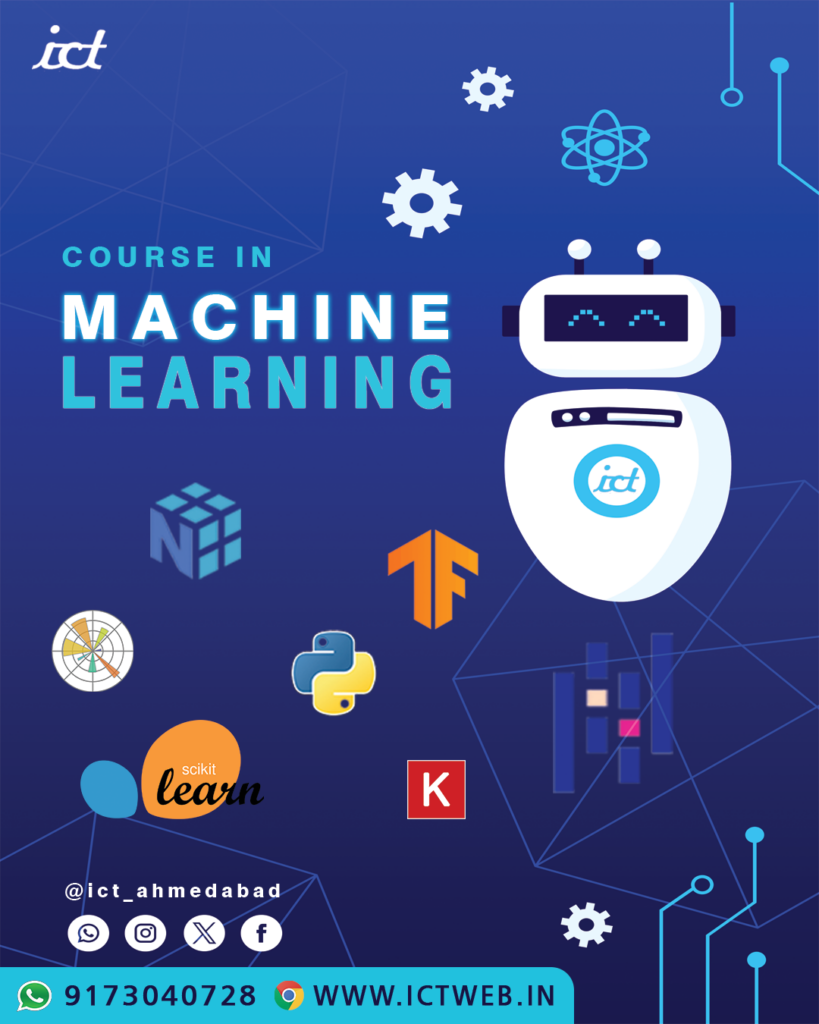Machine Learning Course Training | ICT Ahmedabad

The “Course in Machine Learning” offered by ICT(Institute of Comptuer Training) South Bopal, Ahmedabad provides an in-depth exploration of the foundational principles and advanced techniques used in the field of machine learning. Designed for individuals seeking to enhance their knowledge and practical skills, the course covers a broad range of topics, including supervised and unsupervised learning, neural networks, deep learning, and reinforcement learning. With a blend of theoretical knowledge and hands-on experience, participants will work on real-world projects and datasets, gaining proficiency in popular programming languages like Python and R, as well as industry-standard tools and libraries such as TensorFlow and scikit-learn. Whether you’re a beginner or have some experience in the field, this course equips you with the necessary tools and methodologies to excel in the rapidly growing domain of machine learning.
ML Course Syllabus
Module 1: Introduction to Machine Learning.
Module 2: Data Preprocessing and Exploration.
Module 3: Supervised Learning.
Module 4: Unsupervised Learning.
Module 5: Ensemble Learning.
Module 6: Neural Networks and Deep Learning.
Module 7: Reinforcement Learning.
Module 8: Special Topics in Machine Learning.
Module 9: Ethics and Future of Machine Learning.
Assessments and Projects.

Machine Learning Course Training: Unlocking the Future of Technology
Machine learning (ML) is transforming industries and revolutionizing how we interact with technology. As an essential subset of artificial intelligence (AI), machine learning enables systems to learn from data, adapt, and make decisions without explicit programming. A Machine Learning Course Training offers individuals and professionals the opportunity to understand and implement ML techniques, empowering them with the knowledge to navigate the complexities of this fast-growing field. These courses cover a wide array of topics, starting from the fundamentals of statistics and probability to advanced algorithms and model deployment, ensuring that learners develop a deep understanding of the entire ML pipeline. One of the key benefits of enrolling in a machine learning course is the exposure to various types of machine learning techniques, such as supervised learning, unsupervised learning, and reinforcement learning. Supervised learning, for instance, involves training a model on labeled data to make predictions or classifications, while unsupervised learning focuses on identifying hidden patterns in data without predefined labels. Reinforcement learning, on the other hand, teaches models to make a sequence of decisions by interacting with an environment and learning from the rewards or penalties they receive. A comprehensive ML course offers a hands-on approach to these techniques, allowing learners to implement algorithms like linear regression, decision trees, k-nearest neighbors, and neural networks.
Furthermore, machine learning courses often dive into the practical aspects of data processing and preparation. A large portion of an ML project involves working with data—cleaning, normalizing, and transforming it into a usable format. Students learn how to handle missing values, outliers, and categorical variables, which are common issues faced when working with real-world datasets. They are also introduced to feature engineering techniques, which involve creating new input variables to improve the predictive performance of a model. By mastering these concepts, learners can better prepare data for model training, ultimately improving the quality of the models they develop. In addition to theory, machine learning course training emphasizes the importance of model evaluation and validation. Understanding how to measure the performance of a model is crucial to ensuring that it generalizes well to unseen data. Courses often cover techniques like cross-validation, precision, recall, F1-score, and ROC curves, helping learners assess how well their models are performing in various situations. Model tuning and hyperparameter optimization are also covered in detail, as these are critical steps in improving the accuracy and efficiency of machine learning models.
As the field of machine learning continues to evolve, courses are updated to include the latest advancements, such as deep learning, neural networks, and natural language processing (NLP). With the growing popularity of deep learning, which is a subset of machine learning focused on training artificial neural networks, learners are introduced to complex architectures like convolutional neural networks (CNNs) and recurrent neural networks (RNNs). These techniques have made a significant impact in areas like computer vision, speech recognition, and language modeling. By offering exposure to these cutting-edge topics, machine learning training programs ensure that learners are prepared to tackle challenges in the most current areas of the field.
Ultimately, a machine learning course training equips individuals with the tools, techniques, and knowledge needed to excel in the rapidly evolving tech landscape. With the increasing demand for AI and ML professionals across sectors like healthcare, finance, retail, and transportation, having a solid understanding of machine learning can significantly enhance career opportunities. Whether you’re looking to break into the field or advance your current skill set, enrolling in a comprehensive machine learning course is an excellent investment in your future.
FAQ - Machine Learning(ML) Course
- What is the “Course in Machine Learning” by ICT Ahmedabad?
The “Course in Machine Learning” is a comprehensive program offered by ICT – Institute of Computer Training, South Bopal, Ahmedabad designed to provide participants with both theoretical knowledge and practical skills in the field of machine learning. The course covers key concepts such as supervised and unsupervised learning, neural networks, deep learning, reinforcement learning, and more, with hands-on projects and industry-relevant tools. - Who is this course suitable for?
This course is suitable for anyone interested in learning machine learning, from beginners to those with some prior experience in programming or data science. It is ideal for students, professionals, and anyone looking to enhance their skills in the rapidly growing field of artificial intelligence. - What are the prerequisites for enrolling in the course?
While no advanced prerequisites are required, a basic understanding of programming (preferably in Python) and mathematics, especially linear algebra and calculus, will be helpful. Some familiarity with data analysis or statistics can also be beneficial but is not mandatory. - How long is the course?
The course typically spans several weeks or months, depending on the format (full-time or part-time) and the learning pace. The exact duration will be specified during registration. - What topics are covered in the course?
The course covers a wide array of topics, including:
- Introduction to Machine Learning
- Supervised and Unsupervised Learning
- Regression and Classification Algorithms
- Neural Networks and Deep Learning
- Reinforcement Learning
- Natural Language Processing (NLP)
- Tools & Libraries: Python, TensorFlow, scikit-learn, and more
- Real-world Project Work and Case Studies
- What programming languages and tools are used in the course?
The primary programming language used in the course is Python, as it is widely used in machine learning. Participants will also work with popular libraries such as TensorFlow, Keras, PyTorch, and scikit-learn to implement various machine learning models and algorithms. - Will I receive a certificate upon completion?
Yes, upon successful completion of the course, participants will receive a certificate from ICT Ahmedabad, which can be added to your resume or LinkedIn profile to showcase your newly acquired skills. - Is there any hands-on experience included?
Yes, the course is designed with a strong emphasis on practical learning. Participants will work on hands-on projects, case studies, and assignments, gaining experience with real-world datasets and machine learning tools. - How is the course delivered?
The course is typically delivered through a mix of online lectures, interactive sessions, and hands-on coding exercises. There may also be live webinars or discussions to facilitate learning and provide clarification on complex topics. - What are the career opportunities after completing the course?
Completing this course opens up various career opportunities, including roles such as Machine Learning Engineer, Data Scientist, AI Specialist, Research Scientist, and more. The skills gained will be applicable in various industries, including technology, healthcare, finance, and retail. - How can I apply for the course?
You can apply for the course through ICT Ahmedabad’s official website (www.ictweb.in). The website provides detailed instructions on the application process. - Is there any support provided during the course?
Yes, participants will have access to course instructors and mentors who will provide guidance, feedback, and support throughout the duration of the course. Additionally, there may be a community forum where learners can interact with their peers and seek help with course material.
For any additional questions or clarifications, feel free to contact the admissions team at ICT Ahmedabad.
